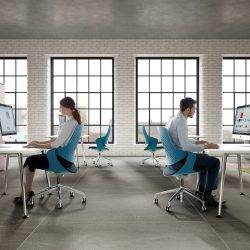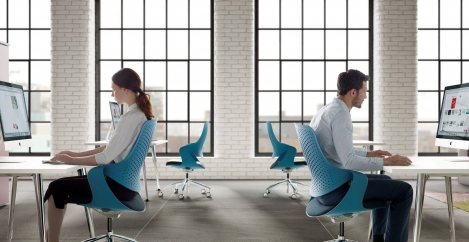May 13, 2017
From footprint to footfall: how the experiential workplace is set to take over the world 1
 From the archive. This piece was originally published in 2016. The culture within which we work determines how effective, successful, fulfilled and well we are in both our professional and personal lives. The organisations for which we work – on whatever basis that might be – the physical surroundings they create, and the other places in which we choose to work are now woven into the fabric of our lives as never before. The technological immersion that allows us to work in new ways also means that each day becomes a series of experiences. Because we are free to work wherever and whenever we choose, we are increasingly able to determine the nature of those experiences. For those who design and manage offices this represents both a great opportunity and an unprecedented series of challenges.
From the archive. This piece was originally published in 2016. The culture within which we work determines how effective, successful, fulfilled and well we are in both our professional and personal lives. The organisations for which we work – on whatever basis that might be – the physical surroundings they create, and the other places in which we choose to work are now woven into the fabric of our lives as never before. The technological immersion that allows us to work in new ways also means that each day becomes a series of experiences. Because we are free to work wherever and whenever we choose, we are increasingly able to determine the nature of those experiences. For those who design and manage offices this represents both a great opportunity and an unprecedented series of challenges.
The most important of these is firstly creating a cohesive organisational culture within the framework of a fractured sense of time and place. The second is offering the sorts of choices that people are used to in their everyday working lives. While the workplace must fulfil its usual objectives, not least in the way it adds to the bottom line, it must also acquire a new role that meets wider organisational and personal goals and integrates seamlessly with the other backdrops to modern work life.
There is a symbiotic relationship between the office and the homes, cafes, hotels and public spaces we have colonised as workplaces. So, just as those other spaces adopt some of the functionality of the office, so too has the office adopted the form and function of the other places we choose to work.
This new white paper outlines the complex forces that are redefining our relationship with work and the places and ways in which we do it. It draws on the lessons from the two most important workplace models of the 21st Century -coworking and tech palaces – and describes how the lessons from those models are applied in other types of workplace. Most of all it describes how organisations can strike the right balance between the traditional and still vital functions of the office as a resource for the business, while also creating the sort of working culture and experience that makes the organisation and its office attractive to employees.

















May 5, 2023 @ 10:28 am
The value of developing a consistent company culture, providing employees with their usual options, and finding the ideal balance between fulfilling customary duties and fostering a positive workplace culture. Amazing blog.